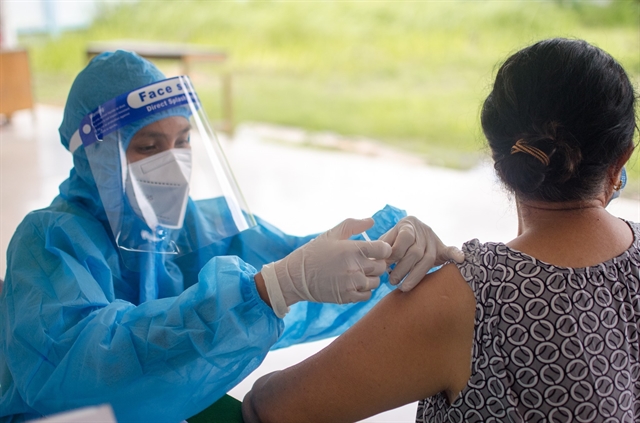 Society
Society


|
| A woman in Bến Tre Province gets a booster shot. — VNA/VNS Photo |
HÀ NỘI — The Ministry of Health has postponed vaccination for those with acute diseases and women who are under 13 weeks pregnant.
This is part of a new vaccination guidelines issued Tuesday.
The guidelines do not cancel vaccinations for those who contracted COVID-19 in the past six months.
Under the new guidelines, the ministry classifies people into four groups.
Group 1: People eligible for vaccination, including those who meet age requirements as recommended by the vaccine manufacturers and are not hypersensitive to active substances or to any excipient of the vaccine's ingredients.
Group 2: Those who need to take precautions regarding vaccination. They need careful and cautious health screening, including those with a history of allergies; people with underlying diseases; people who have lost consciousness or behavioral capacity; people with history of thrombocytopenia and/or coagulopathy; women over 13 weeks of pregnancy; and those with abnormal vital signs.
Group 3: People who need vaccination postponement, i.e. those who are suffering from acute diseases and women less than 13 weeks pregnant.
Group 4: Contraindications to immunisation are made for those who have clear history of anaphylaxis to the same type of COVID-19 vaccine or were previously inoculated; and for any contraindications present as recommended by the vaccine manufacturers.
Following health screening results, those eligible for vaccinations will have them immediately administered, while those with any of the extenuating factors will be postponed.
Those with history of life threatening (or grade 3) anaphylaxis, for any cause, will be inoculated at medical facilities that are capable of providing anaphylaxis emergency response.
Women in pregnancy of 13 weeks and more will be vaccinated and monitored at medical facilities that are capable of dealing with obstetric emergency. They need to be provided with consultancy about the vaccinaiton benefits and risks and have to sign a commitment to get the vaccination.
Vaccination for pregnant and breasfeeding women needs to follow vaccine administration guidelines. So far, among eight types of COVID-19 vaccine licensed for use in Việt Nam, only Sputnik V vaccine is not allowed for pregnant and breastfeeding women.
Those with contraindications to vaccination will not be inoculated.
As of December 21, Việt Nam had administered over 140.4 million doses of COVID-19 vaccines.
Protection for high-risk groups needed
The Ministry of Health has also sent an urgent message to guide localities to manage and protect high-risk groups, amid the complicated development of the pandemic with the appearance of highly transmissible and dangerous variants such as Delta and Omicron.
The group with high risk of suffering critical conditions and death after getting COVID-19 is people who are over 50 years old, have underlining conditions, or are unvaccinated or partly vaccinated, according to the ministry.
It requires medical supervision and management for early detection and treatment to mitigate the fatality rate, particularly while the country is implementing safe and flexible adaptation and effective control of the COVID-19 pandemic, the ministry said.
Priority should be given to the management of high-risk groups, vaccination, testing, caring and treatment for COVID-19 patients of high-risk groups; information dissemination and consultancy about COVID-19 prevention and control; protection for high-risk people who live with COVID-19 patients; and providing people with physical and psychological care.
The ministry asked localities to review and make lists of high-risk groups and households with high-risk people.
The management of people of high-risk groups should focus on factors such as their underlying diseases; health conditions (ability to walk and take care of themselves); their living situation (living alone or with family); and assistance demand (care, treatment for underlying diseases, medicine and other needs).
Localities are required to apply the e-health app to manage and follow the health conditions and vaccination of high-risk people.
They are also ordered to set up COVID-19 community groups or groups taking care of COVID-19 patients to help make lists and supervise high-risk groups.
Localities must fully inform local residents of the benefits of COVID-19 vaccination and mobilise those in high-risk groups to get full vaccine shots to ensure no one is left behind.
Mobile vaccination teams should be set up to help inoculate people at home if needed. —VNS